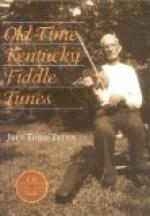She saw Layson long before he knew that she was there.
“Oh,” she cried, relieved, “that you?”
He hurried to her. “I thought you mountain people all went early to your beds,” said he, and laughed, “but I met Joe Lorey on the trail and here you are, standing by your bridge, star-gazing.”
Of course she would not tell him of her worries. She took the loophole offered by his words and looked gravely up at the far, spangled sky. “Yes,” said she, “they’re mighty pretty, ain’t they?”
Layson was in abnormal mood. The prospect of his Aunt’s arrival, the certainty that something more than he had thought had come out of his mountain sojourn, the fact that he was sure that he regretted Barbara Holton’s coming, old Neb’s arrival, and his raking up of ancient scores against the lowland maiden’s father, his meeting with Joe Lorey and the latter’s treatment of him, had wrought him to a pitch of mild excitement. The girl looked most alluring as she stood there in the moonlight.
“My friends are in the valley and are coming up to-morrow,” he said to her. “Do you know that this may be the last time I shall ever see you all alone?”
She gasped. He had not hinted at a thing like that before. “You ain’t going back with them, are you?” she asked, her voice a little tremulous from the shock of the surprise. “You ain’t going back with them—never to come hyar no more, are you?”
He stepped nearer to her. “Why, little one,” he asked, “would you care?”
“Care?” she said with thrilling voice, and then, gaining better self-control, tried to appear indifferent. “Why should I?” she said lightly. “I ain’t nothin’ to you and you ain’t nothin’ to me.”
His heart denied her words. “Don’t say that!” he cried. “You don’t know how dear you’ve grown to me.” He stepped toward her with his arms outstretched. He almost reached her and he knew, and she knew, instinctively, that if he had he would have kissed her.
[Illustration: “NO MAN CAN CROSS THIS BRIDGE, UNLESS—UNLESS,—“]
She shrank back like a startled fawn, when his foot was almost on the bridge that spanned the chasm between them and her cabin.
“Don’t you dare to touch me!” she said fiercely.
She sped back upon the little bridge, and, when he would have followed, held her hand up with a gesture of such native dignity, offended womanhood, that he stopped where he was, abashed.
“No—no, sir; you can’t cross this bridge,” said she. “No man ever can, unless—unless—”
Almost sobbing, now, she left the sentence incomplete; and then: “Oh, you wouldn’t dared act so to a bluegrass girl! But I know what’s right as well as them. It don’t take no book-learnin’ to tell me as how a kiss like that you planned for me would be a sign that really you care for me no more than for the critters that you hunt an’ kill for pastime up hyar among the mountings.”




